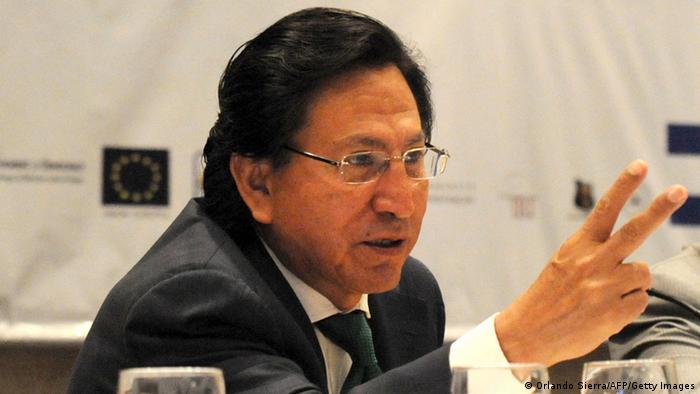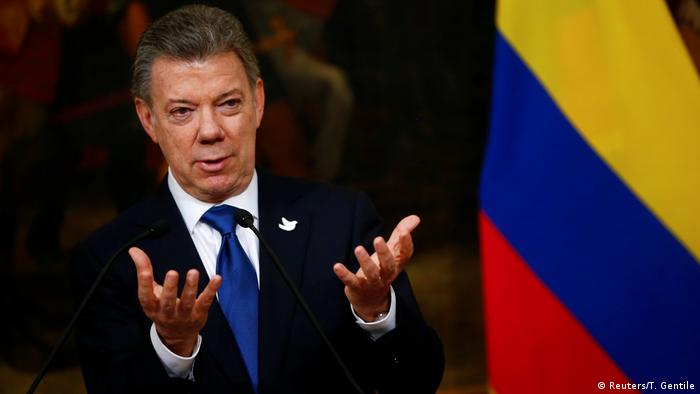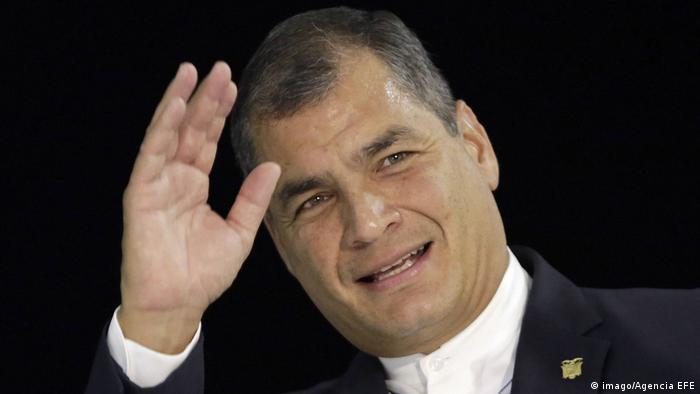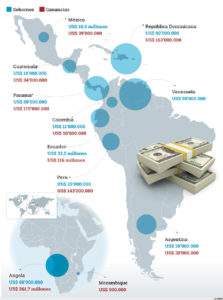Mes: febrero 2017
La caída de Alejandro Toledo: De los 4 suyos, al soborno de los US$20 millones
“Caso Odebrecht”: imputaciones en medio continente
Presuntamente implicados en el escándalo de corrupción que lleva el nombre de la constructora brasileña Odebrecht, el expresidente peruano Alejandro Toledo y el actual mandatario panameño están en la mira de la Justicia.
Considerada por mucho tiempo como la mayor empresa de infraestructuras de América Latina, la constructora brasileña Odebrecht tiene ahora su reputación hecha añicos por revelaciones según las cuales montó una red de pago de sobornos a políticos y funcionarios en una decena de países del subcontinente. El Departamento de Justicia de Estados Unidos acusó a la compañía en diciembre de 2016 de expandir sus negocios regionales gracias a un “departamento de cohechos” que operaba de forma sistemática, usando también bancos estadounidenses y europeos para hacer los pagos. Odebrecht se declaró entonces culpable ante la Justicia de Estados Unidos, Suiza y Brasil del pago de 788 millones de dólares en sobornos desde 2001. Presuntamente implicados en el escándalo de corrupción que lleva el nombre de la constructora, el expresidente peruano Alejandro Toledo y el actual mandatario panameño, Juan Carlos Varela, están en la mira de la Justicia.
Alejandro Toledo, buscado
Al caer la noche en Lima este jueves (9.2.2017), un juez peruano dictó orden de captura nacional e internacional contra Toledo –jefe del Gobierno local entre 2001 y 2006– y su posterior encarcelamiento preliminar por 18 meses. El cargo puntual en su contra: el cobro 20 millones de dólares en sobornos de Odebrecht. El magistrado Richard Concepción, titular del Primer Juzgado de Investigación Preparatoria de la Sala Penal Nacional, declaró fundado el pedido de prisión preventiva solicitado por el fiscal anticorrupción Hamilton Castro, quien imputa al exmandatario los presuntos delitos de tráfico de influencias y lavado de activos. Toledo se encuentra fuera de Perú, y aparentemente estuvo el pasado fin de semana en París, aunque su residencia habitual la tiene en Estados Unidos, donde trabaja como investigador en la Universidad de Stanford, California. Ese mismo día, la trama de corrupción salpicó también al actual presidente panameño.
A Juan Carlos Varela se le imputa el haber recibido “donaciones” de la constructora brasileña. En un comparecencia convocada de urgencia, el “hombre fuerte” de Panamá aseguró que “no existen donaciones de la empresa Odebrecht” y se comprometió a entregar una lista de los donativos privados que recibió en la campaña de 2014, contradiciendo así la acusación de su antiguo ministro consejero y socio del bufete Mossack Fonseca, Ramón Fonseca Mora, quien había callado durante meses, prácticamente desde que su despacho de abogados protagonizó en abril de 2016 el escándalo conocido como “Papeles de Panamá”. Este 9 de febrero, Fonseca Mora soltó una bomba informativa que ha desatado un vendaval político en el país: “A mí el presidente Varela… escuchen esto con atención y que me caiga un rayo si es mentira… me dijo que él había aceptado donaciones de Odebrecht porque no se podía pelear con todo el mundo”, aseguró.
Juan Carlos Varela, señalado
Fonseca Mora hizo esas declaraciones a las puertas de la Fiscalía. El abogado acudió de manera voluntaria al Ministerio Público, junto a su socio en la firma, Jürgen Mossack, después de que sus oficinas fuesen allanadas por su presunto involucramiento en el caso “Lava Jato”, la mayor trama de corrupción de la historia de Brasil. Por ese mismo caso, la Fiscalía acusó a ambos abogados de blanquear capitales y de ser una “organización criminal” que ayudaba a lavar dinero en la trama de “Lava Jato”, que implica a decenas de empresarios y políticos de Brasil. Fonseca Mora reconoció que su bufete creó una “decena” de sociedades anónimas a petición de distintos bancos y que luego las vendieron a personas implicadas en el caso “Lavo Jato”, pero que es una cantidad, a su parecer, insignificante comparada con las más de “10.000 empresas” involucradas en esta investigación. El abogado acusó además al Ministerio Público de usarle como “chivo expiatorio”.
Fonseca Mora alega que la Fiscalía no ha ordenado aún el allanamiento de las oficinas de Odebrecht en Panamá a pesar de que hay abierta un investigación por los sobornos pagados a funcionarios panameños. “Aquí en Panamá se han constituido muchas sociedades de Odebrecht y, aquí en Panamá, Odebrecht coimeó (sobornó) fuertemente”, dijo Fonseca Mora. Las incendiarias declaraciones que hizo este jueves (9.2.2017) no sólo han sorprendido por su contenido, sino también por la relevancia de quien las orea. Fonseca Mora no es un cualquiera en Panamá. “Todo el mundo ha creído que Varela esta al lado mío, que me ha ayudado y que soy su amigo. Eso es mentira”, dijo enfático el abogado, que presidió el gobernante Partido Panameñista hasta marzo de 2016 y es percibido como amigo del mandatario. Juan Carlos Varela intenta salir ileso de esta situación, esgrimiendo que este episodio es evidencia de que el Poder Judicial local es autónomo.
Juan Manuel Santos, refuta las sospechas
“Las declaraciones de mi amigo, el señor Fonseca, envían un mensaje claro al país de que la Justicia es independiente, y de que este presidente no está protegiendo a nadie, y de que a cada uno le toca rendir cuentas por sus actos”, dijo Varela de cara a los medios. Varela, quien asumió la jefatura del Gobierno panameño en julio de 2014, ha asegurado desde entonces que lidia una lucha sin precedentes contra la corrupción. “A quienes me critican y al país entero les recuerdo que la justicia es ciega, y nadie está por encima de la Ley. Quien comete y se le prueba un delito, será castigado con todo el peso de la ley”, concluyó el político. El miércoles (8.2.2017), su homólogo colombiano, Juan Manuel Santos, también se vio obligado a pronunciarse brevemente vía Twitter sobre su supuesto vínculo con la constructora brasileña. Este jueves (9.2.2017), el entorno de la campaña Santos para su reelección en 2014 negó haber recibido dinero de Odebrecht.
El que articuló las palabras más contundente al respecto este 9 de febrero fue el empresario Andrés Giraldo, a quien el exsenador Otto Bula –detenido por los sobornos de la constructora– dijo haber entregado un millón de dólares procedentes de esas coimas. Ese dinero, según Bula, llegó a la campaña electoral de Santos, ya que Giraldo supuestamente se lo entregó a Roberto Prieto, gerente de ese proyecto político. “Estoy dispuesto a ir ante el polígrafo. No recibí dinero de Otto Bula”, dijo Giraldo en una entrevista con la emisora Blu Radio, reconociendo que se había reunido con el exsenador, pero negando que hubieran hablado de la campaña electoral porque ésta se dio posteriormente. Las ramificaciones políticas del escándalo crecieron este 8 de febrero, cuando el fiscal general de Colombia, Néstor Humberto Martínez, desveló que Bula –quien recibió 4,6 millones de dólares en coimas– dijo que un millón de dólares fue para Prieto.
Rafael Correa, predice “guerra sucia”
Los tentáculos de Odebrecht también llegaron hasta el candidato del partido uribista Centro Democrático en 2014, Óscar Iván Zuluaga, rival de Santos en aquella elección. Según reveló recientemente el semanario brasileño Veja, parte de los honorarios del publicista Duda Mendonça, que asesoró a Zuluaga en la campaña, fueron pagados por Odebrecht, que tiene contratos para la construcción de carreteras y otras obras de infraestructura en Colombia. Las investigaciones en este país sudamericano se han centrado en los millonarios contratos obtenidos por Odebrecht para la construcción de la autopista Ruta del Sol II, que comunica al centro con el norte del país, aún no concluida, y para las obras de mejora de la navegabilidad del río Magdalena, el principal de Colombia. Sin embargo, también alcanzan una obra contratada por la Empresa de Acueducto de Bogotá en la cual han sido detectadas igualmente irregularidades.
Mientras tanto, se supo que el procurador general de República Dominicana, Jean Alain Rodríguez, se entrevistará con las autoridades brasileñas que investigan el escándalo de corrupción “Lava Jato” para aclarar si la empresa Odebrecht pagó sobornos también en el país caribeño. La compañía admitió haber pagado en el país caribeño 92 millones de dólares por concepto de cohecho para acceder a contratos a lo largo de casi dos décadas. El próximo 16 de febrero tendrá lugar una reunión técnica multilateral sobre el caso “Lava Jato” con los fiscales que participan en la investigación. El día 17 se realizarán reuniones de trabajo con cada uno de los procuradores o fiscales generales de los países que investigan las actividades de Odebrecht. En Ecuador, el presidente, Rafael Correa, alertó que podrían estallar “bombas” mediáticas en el marco de una “campaña sucia” contra el oficialismo, que lleva diez años en el poder. Según el mandatario, éstas podrían aludir a Odebrecht.
ERC ( EFE / dpa )
En: dw
Ariana Grande – Side To Side ft. Nicki Minaj
Muy gracioso: SNL – Bienvenidos a los Estados Unidos de Trump!
Supreme Court nominee Gorsuch calls Trump’s tweets ‘disheartening’
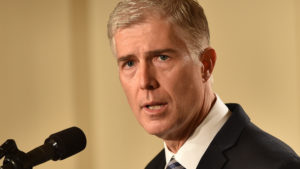
Image: http://ei.marketwatch.com/Multimedia/2017/01/31/Photos/ZH/MW-FE872_gorsuc_20170131202126_ZH.jpg?uuid=c098f65e-e81c-11e6-96ab-001cc448aede
Washington (CNN) – Supreme Court nominee Neil Gorsuch told a US senator Wednesday that President Donald Trump’s tweets about the judiciary are “demoralizing” and “disheartening.”
In a meeting with Connecticut Democratic Sen. Richard Blumenthal, Gorsuch, who’s largely been silent since Trump nominated him last week, took exception to Trump calling a federal judge in Seattle a “so-called judge” after blocking the President’s travel ban.
“He said very specifically that they were demoralizing and disheartening and he characterized them very specifically that way,” Blumenthal said of Gorsuch. “I said they were more than disheartening and I said to him that he has an obligation to make his views clear to the American people, so they understand how abhorrent or unacceptable President Trump’s attacks on the judiciary are.”
Ron Bonjean, who is leading communications for Gorsuch during the confirmation process, confirmed Gorsuch called Trump’s tweet about the “so-called judge” “disheartening” and “demoralizing” in his conversation with Blumenthal.
Trump’s comments could complicate the upcoming hearings for Gorsuch, who is certain to face questions about Trump’s tweets from Democrats. Liberals, already concerned with Gorsuch’s record, have also asked how he will demonstrate independence from the President.
Neil Gorsuch fast facts
But Gorsuch’s statement could help him with some moderate lawmakers. In the private meeting with Blumenthal, and in one with Senate Democratic Leader Chuck Schumer, Gorsuch seems to be trying to address the issue proactively.
Gorsuch told Schumer in a meeting Tuesday that an attack on his fellow judges is an attack on all, and he said he is incredibly disheartened when people attack his fellow judges, according to a source familiar with the discussion who paraphrased the judge’s comments. He also told Schumer that judges are used to being criticized and are no one’s lackeys.
Blumenthal, a member of the Senate Judiciary Committee, said he brought up examples of Trump’s recent rhetoric, including the tweets and the President’s criticism of the federal court Wednesday morning before law enforcement officials.
That’s when Gorsuch expressed disappointment in Trump’s comments, Blumenthal said. “He didn’t disagree with me on that point.”
“I said to him if a litigant before your court — and the President of the United States is in fact a litigant right now in the immigration ban cases — said what President Trump said, you would hold him in contempt of court,” Blumenthal said, adding that Gorsuch did not give a response to that comment.
Schumer spokesman Matt House said Gorsuch isn’t going far enough.
“Given the President’s comments, that a very milquetoast response,” House said. “Anyone can be disheartened, but the judge refused to condemn the comments privately or publicly.”
Gorsuch meeting with senators
Gorsuch, a federal appeals court judge from Colorado, has been meeting with senators on both sides of the aisle since being nominated last week.
Blumenthal said the two men met for 40 minutes in the senator’s office, where they discussed their shared running habits and “common love for the outdoors,” among more serious conversations about Gorsuch’s judicial views and background.
While Blumenthal described the meeting as “amicable,” he said he was “disappointed” in Gorsuch’s responses to his questions and felt he was not being forthcoming and specific enough. He said he was especially looking for more answers on Gorsuch’s thoughts about reproductive rights, workers’ rights and consumer protection issues.
Asked if Blumenthal is open to supporting Gorsuch, the senator said he will wait until after the Judiciary Committee holds hearings on Gorsuch’s nomination to make a final decision but that he has “serious and deep concerns” about him.
Blumenthal said he supports requiring a 60-vote threshold to confirm the Supreme Court nominee, and if he decides to oppose Gorsuch, Blumenthal said he will use “every tool” at his disposal to fight the nomination. Republicans need eight of their Democratic colleagues to break that threshold and prevent a filibuster.
Blumenthal was one of three Democratic senators that Gorsuch met with on Wednesday. He also sat down with Democratic Sens. Claire McCaskill of Missouri and Sen. Heidi Heitkamp of North Dakota — two states that Trump won.
Impact of Trump’s tweets
Trump’s tweets have disturbed many in the legal community. While it is not unusual for a president to disagree with a ruling from the Judicial Branch, Trump is using his Twitter account to call out individual judges while cases are being heard.
His “so-called judge” tweet came after Washington state-based federal Judge James Robart Friday blocked Trump’s executive order barring citizens of seven Muslim-majority countries — Iraq, Syria, Iran, Libya, Somalia, Sudan and Yemen — from entering the US for 90 days. Trump’s order also blocked all refugees from entering 120 days and indefinitely halts refugees from Syria.
Trump has continued to call out Robart in the days since the ruling.
“Just cannot believe a judge would put our country in such peril,” Trump tweeted. “If something happens blame him and court system. People pouring in. Bad!” Trump tweeted.
The Trump administration has appealed Robart’s temporary restraining order. A panel of judges from the Ninth Circuit Court of Appeals heard oral arguments Tuesday and is expected to rule this week.
Last summer, Trump also went after US District Court Judge Gonzalo Curiel, who was oveseeing a Trump University lawsuit. Although Curiel was born in Indiana, Trump said he was in an “absolute conflict” in presiding over litigation given that he was of “Mexican heritage.”
Trump’s comments also risk offending some current Supreme Court justices, including Chief Justice John Roberts, who recently wrote about the importance of lower court judges. In his annual report last month, Roberts called judges “selfless, patriotic and brave,” and he said “this is no job for impulsive, timid or inattentive souls.”
“You might be asking,” Roberts wrote about life-tenured judges, “why any lawyer would want a job that requires long hours, exacting skill and intense devotion — while promising high stress, solitary confinement and guaranteed criticism.”
“The answer lies in the rewards of public service,” Roberts wrote.
Art Roderick, a CNN contributor and a retired US Marshal, noted that Trump should be “fully aware” of what kinds of threats the judiciary receives because the President’s own sister is a federal judge.
“Any time a federal judge receives a threat, the marshals investigate and provide the proper protection based on that threat,” Roderick said. “Anybody that has looked at what the US Marshals do has got to realize that an attack on any judge is an attack on the rule of law of the United States.”
CNN’s Ariane de Vogue, Ted Barrett, Jeff Zeleny and Jeremy Diamond contributed to this report.
In: cnn
Peel P50: The Smallest Car in the World at the BBC – Top Gear – BBC
Nelly – Country Grammar (Hot…)
Spice – So Mi Like It (Raw)
Jeff Sessions faces a tough job as the new attorney general — and Trump isn’t making it any easier
After enduring an unusually bitter confirmation battle for a sitting U.S. senator, Jeff Sessions will barely have time to settle into his fifth-floor office at the Justice Department before he takes center stage in some of the nation’s most acute controversies.
Sessions was approved 52 to 47 on Wednesday night after a prolonged fight, in a vote largely down party lines. Sen. Joe Manchin III of West Virginia was the only Democrat who supported him. Sessions voted present.
With too few votes to block the nomination, Senate Democrats slow-walked the confirmation, staging a dramatic overnight session Tuesday after Republicans silenced Sen. Elizabeth Warren (D-Mass.), preventing her from reading decades-old criticism of Sessions from Coretta Scott King, the widow of slain civil rights leader the Rev. Martin Luther King Jr.
Even House Democrats, who have no vote on the confirmation, joined in protest Wednesday evening in the Senate chamber.
At the Justice Department, Sessions will be responsible for leading the legal defense of President Trump’s immigration restrictions, for halting and investigating terrorist attacks, and for investigating hate crimes and abuses by local and state law enforcement.
He also is expected to play a key role in implementing Trump’s promised crackdown on illegal immigration by increasing deportations.
His boss isn’t making things easier. Last weekend, Trump denounced a federal judge in Seattle who had temporarily blocked Trump’s executive order suspending immigration and refugees from seven Muslim-majority countries.
A three-judge panel from the U.S. 9th Circuit Court of Appeals in San Francisco heard arguments Tuesday on the government’s effort to lift the stay. The judges did not issue an immediate ruling, and Trump complained Wednesday that the legal process was taking too long.
“You could be a lawyer, or you don’t have to be a lawyer. If you were a good student in high school or a bad student in high school, you can understand this, and it’s really incredible to me that we have a court case that’s going on so long,” Trump told a law enforcement chiefs’ conference in Washington.
The legal battle over the travel ban is expected to wind up in the U.S. Supreme Court.
Sessions “is in a tight spot, that is for sure,” said John Hudak, a senior fellow at the Brookings Institution, a Washington think tank. “He has a tough job for a whole panoply of reasons.”
Sessions was first elected to the Senate from Alabama in 1996, and served two decades on the Judiciary Committee, which reviews federal judges and conducts oversight of the Justice Department.
But in a staunchly partisan era, his confirmation hearings quickly broke on party lines. In the end, he did not receive a single vote from Democrats on the committee.
Supporters say Sessions is uniquely qualified to lead the Justice Department in such a turbulent time.
Pointing to his 12 years as U.S. attorney in Alabama, and two years as state attorney general, they said Sessions has the experience to prosecute criminals, make policy decisions and aggressively tackle illegal immigration.
They described him as personable and courteous, traits that led him to be generally well regarded in the Senate, and could help him win over career Justice Department lawyers.
“He is serious about both the law and the department, and with his background he is uniquely equipped to handle the job,” said Michael B. Mukasey, who served as attorney general under President George W. Bush and who testified in support of Sessions’ nomination. “I suspect the learning curve won’t be too steep for him.”
Democrats and civil rights groups worry that Sessions’ conservative record on civil rights, voting rights and environmental laws portends trouble.
They also are concerned that such an ardent Trump advocate — Sessions was one of Trump’s earliest and most enthusiastic campaign surrogates — will oversee the reported federal investigation into potential ties between the Trump campaign and the Russian government.
U.S. intelligence agencies last month issued a report that concluded Russian intelligence agencies launched cyberattacks against Democratic Party officials and took other measures aimed at influencing American voters to support Trump.
Sen. Dianne Feinstein of California, the top Democrat on the Senate Judiciary Committee, and other Democrats have questioned whether Sessions can be trusted to enforce the law, especially if potential investigative targets are in the White House.
“It is very difficult to reconcile for me the independence and objectivity necessary for the position of attorney general with the partisanship this nominee has demonstrated,” Feinstein said to explain why she voted against Sessions’ nomination in the Judiciary Committee.
Sessions has said he won’t be afraid to tell Trump he is wrong or that a planned action is unconstitutional. An attorney general has “to be able to say no, both for the country, for the legal system and for the president, to avoid situations that are not acceptable. I understand that duty,” Sessions testified.
Legal experts and former Justice Department officials said Sessions would have a difficult task. Trump is used to getting his way. He also has expressed expansive views of presidential authority that worry even the most conservative legal scholars.
John Yoo, a law professor at UC Berkeley who served in the Justice Department in the George W. Bush administration, said Sessions would have to combat those presidential impulses while retaining Trump’s trust — a task that Yoo likened to walking a tightrope.
“If you are too far from the president, you will get cut out of the decision-making process and you are not doing your job as attorney general,” said Yoo, who recently wrote in the New York Times that he had concerns about Trump’s use of presidential authority.
While in the Justice Department, Yoo was a vocal advocate for a muscular executive branch. He wrote the so-called torture memos that gave the Bush administration the legal authority to approve the CIA’s use of “enhanced interrogation” of suspected terrorists, including waterboarding.
“On the other hand,” Yoo added, “someone has to tell the president that what he is doing is illegal or unconstitutional, even when Trump’s instincts and his political advisors are pushing for it. Sessions is the only person in the administration now who can do that, tell the president no. We will have to see how that plays out.”
In contrast, Yoo said James B. Comey, the FBI director, has little political capital.
In July, Comey publicly announced that no charges would be filed against Democratic presidential nominee Hillary Clinton for her email practices as secretary of State, infuriating Republicans. Then, about a week before the November election, he announced the FBI was reviewing newly discovered emails, astonishing Democrats.
The last-minute disclosure threw the presidential race into chaos, and even though Comey said several days later that the review had ended with no change in the bureau’s conclusion in the Clinton case, Democrats blamed Comey for tipping the election in Trump’s favor.
Sessions had no role in that controversy, but he may have to deal with its aftermath. Comey’s actions — and others taken by the Justice Department in the email inquiry — are under investigation by the Justice Department’s inspector general.
The outcome of that inquiry “could be very messy,” Yoo said. “Suppose it determines that Comey acted improperly and made bad decisions. The natural question then is, should he be replaced? Whatever the decision, it is going to be unpopular.”
Sessions can expect a frosty reception from some staffers at the Justice Department, particularly those in the civil rights and environmental units, which expect their broad authority under the Obama administration to be curtailed. Lawyers in other divisions said they didn’t expect much to change.
Despite the uneasiness, lawyers at the Justice Department said they were pleased with early White House choices for key department posts.
In particular, they cited the selection of Rod Rosenstein, a longtime Justice Department lawyer who has served as U.S. attorney in Maryland in both Republican and Democratic administrations, to be deputy attorney general.
“Rod is a great pick,” said David O’Neil, a former top Justice Department official in the Obama administration, echoing comments of current lawyers. “He is as institutional as they come. He has a lot of integrity.”
The deputy attorney general runs day-to-day operations in the sprawling department, which includes the FBI, Federal Bureau of Prisons and the Bureau of Alcohol, Tobacco, Firearms and Explosives. It has more than 100,000 employees and a $28.7-billion budget.
In: latimes

